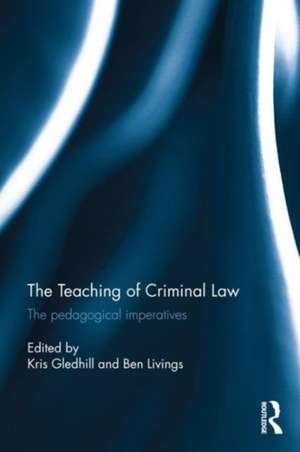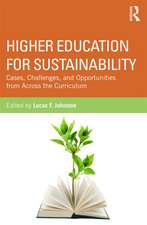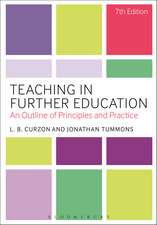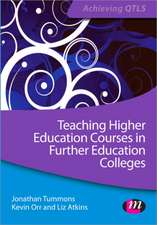The Teaching of Criminal Law: The pedagogical imperatives: Legal Pedagogy
Editat de Kris Gledhill, Ben Livingsen Limba Engleză Hardback – 8 sep 2016
This edited collection brings together contributions from academic teachers of criminal law from Australia, New Zealand, the United Kingdom, and Ireland who have considered issues of course design and often implemented them. Together, they examine several innovative approaches to the teaching of criminal law that have been adopted in a number of law schools around the world, both in teaching methodology and substantive content. The authors offer numerous suggestions for the design of a criminal law course that will ensure students gain useful insights into criminal law and its role in society.
This book helps fill the gap in research into criminal law pedagogy and demonstrates that there are alternative ways of delivering this core part of the law degree. As such, this book will be of key interest to researchers, academics and lecturers in the fields of criminal law, pedagogy and teaching methods.
| Toate formatele și edițiile | Preț | Express |
|---|---|---|
| Paperback (1) | 303.23 lei 6-8 săpt. | |
| Taylor & Francis – 7 mar 2018 | 303.23 lei 6-8 săpt. | |
| Hardback (1) | 847.31 lei 6-8 săpt. | |
| Taylor & Francis – 8 sep 2016 | 847.31 lei 6-8 săpt. |
Preț: 847.31 lei
Preț vechi: 1177.91 lei
-28% Nou
Puncte Express: 1271
Preț estimativ în valută:
162.18€ • 176.23$ • 136.32£
162.18€ • 176.23$ • 136.32£
Carte tipărită la comandă
Livrare economică 21 aprilie-05 mai
Preluare comenzi: 021 569.72.76
Specificații
ISBN-13: 9781138841994
ISBN-10: 1138841994
Pagini: 222
Ilustrații: 2
Dimensiuni: 156 x 234 mm
Greutate: 0.43 kg
Ediția:1
Editura: Taylor & Francis
Colecția Routledge
Seria Legal Pedagogy
Locul publicării:Oxford, United Kingdom
ISBN-10: 1138841994
Pagini: 222
Ilustrații: 2
Dimensiuni: 156 x 234 mm
Greutate: 0.43 kg
Ediția:1
Editura: Taylor & Francis
Colecția Routledge
Seria Legal Pedagogy
Locul publicării:Oxford, United Kingdom
Public țintă
Postgraduate and ProfessionalCuprins
1. Introduction 2. Building Block or Stumbling Block? Teaching Actus Reus and Mens Rea in Criminal Law 3. Teaching the Elements of Crimes 4. Enhancing Interactivity in the Teaching of Criminal Law: Using Response Technology in the Lecture Theatre 5. Using Problem-Based Learning to Enhance the Study of Criminal Law 6. Turning Criminal Law Upside Down 7. Criminal Law Pedagogy and the Australian State Codes 8. Teaching Criminal Law as Statutory Interpretation 9. Shaking the Foundations: Criminal Law as a Means of Critiquing the Assumptions of the Centrality of Doctrine in Law 10. The Challenges and Benefits of Integrating Criminal Law, Litigation and Evidence 11. ‘Crime and the Criminal Process’: Challenging Traditions, Breaking Boundaries 12. Context and Connection 13. Teaching and Learning Criminal Law ‘in Context’: Taking ‘Context’ Seriously 14. Teaching Indigenous and Minority Students and Perspectives in Criminal Law 15. Introducing Feminist Legal Jurisprudence through the Teaching of Criminal Law 16. Choice 17. The Absence of Regulatory Crime from the Criminal Law Curriculum 18. Conclusion: Looking to the future
Notă biografică
Kris Gledhill is Associate Professor at AUT Law School, Auckland, New Zealand.
Ben Livings is Senior Lecturer at the Law School of the University of New England in New South Wales, Australia.
Ben Livings is Senior Lecturer at the Law School of the University of New England in New South Wales, Australia.
Recenzii
'We can lament the lingering influence of ‘old school’ doctrine-focused criminal law teaching or we can articulate better ways to teach and study criminal law. The contributors to this fine collection are to be congratulated for taking the latter more constructive path. Developing curricula that extend beyond the traditional ‘general principles + homicide + theft’ formula, refusing to artificially extract criminal law rules from the practical and procedures by which they are operationalised, taking historical, cultural, political, economic and other contextual factors seriously, valuing Indigenous and feminist perspectives and insights, employing problem-based learning – it is heartening to read that these and other exciting approaches are well on the way to becoming the ‘new normal’ in criminal law teaching.'
Luke McNamara, Professor, Faculty of Law, UNSW & co-author of D Brown et al, Criminal Laws: Materials and Commentary on Criminal Law and Process of New South Wales (Federation Press, 6th ed, 2015)
"Gledhill and Livings’ collection provides criminal law teachers with a uniquely useful resource to aid pedagogical self-reflection and future conversations with various stakeholders. It serves as an important catalyst to take the legal pedagogy agenda forward."
Daniel Pascoe, 'Criminal Law Pedagogy', Legal Quarterly Vol. 72 No. 2 (2021) 406–410, DOI: 10.53386/nilq.v72i2.729
"This publication is a useful, timely, innovative, and aspirational contribution to a small body of literature on subject-specific teaching and learning methods used in law schools. It is a worthwhile addition to any criminal law library and serves as a catalogue of new ideas and useful reminders for anyone involved in the teaching of criminal law. The many diverse and well-developed chapters of this book offer great insight into the ways in which criminal law is, has been, and ought to be taught at university."
Andreas Schloenhardt, Professor of Criminal law, The University of Queensland, Australia.
Luke McNamara, Professor, Faculty of Law, UNSW & co-author of D Brown et al, Criminal Laws: Materials and Commentary on Criminal Law and Process of New South Wales (Federation Press, 6th ed, 2015)
"Gledhill and Livings’ collection provides criminal law teachers with a uniquely useful resource to aid pedagogical self-reflection and future conversations with various stakeholders. It serves as an important catalyst to take the legal pedagogy agenda forward."
Daniel Pascoe, 'Criminal Law Pedagogy', Legal Quarterly Vol. 72 No. 2 (2021) 406–410, DOI: 10.53386/nilq.v72i2.729
"This publication is a useful, timely, innovative, and aspirational contribution to a small body of literature on subject-specific teaching and learning methods used in law schools. It is a worthwhile addition to any criminal law library and serves as a catalogue of new ideas and useful reminders for anyone involved in the teaching of criminal law. The many diverse and well-developed chapters of this book offer great insight into the ways in which criminal law is, has been, and ought to be taught at university."
Andreas Schloenhardt, Professor of Criminal law, The University of Queensland, Australia.
Descriere
This book provides the first considered discussion of the pedagogy that should inform the teaching of criminal law. It examines the relationship between the general principles and specific offences that can be used to illustrate pedagogical theory, and considers several innovative approaches to the teaching of criminal law that have been adopted in a small number of law schools.




















